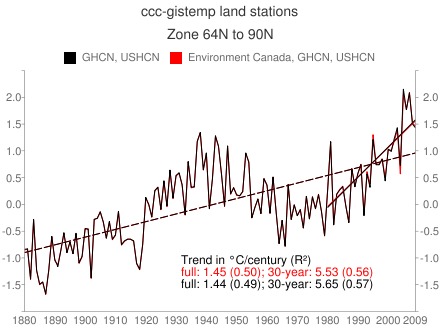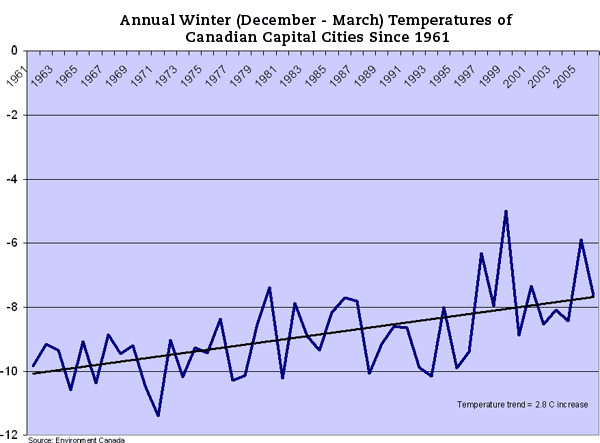Twice as much Canada, same warming climate
Posted on 23 November 2010 by Ned
Guest post by Ned
Canada is the world's second-largest country, so obviously Canadian weather stations will be important in any global surface temperature reconstruction based on station data. Yet as many observers have noted, the number of Canadian weather stations included in the Global Historical Climatology Network (GHCN) database has declined since the early 1990s.
Is this decline significant?
An answer to this question has been provided by the Clear Climate Code (CCC) team. The CCC project is an independent effort to replicate NASA's global temperature reconstruction using open-source software, with all code rewritten to emphasize clarity. Having successfully duplicated the results of the official NASA GISS temperature reconstruction, CCC is now able to perform new experiments using different data or alternative processing methods.
In a particularly nifty example of what can now be done, CCC recalculated the global temperature dataset using additional data obtained directly from the Environment Canada (EC) website. This new analysis includes many stations that are not listed in the GHCN database. While there still aren't as many stations reporting as there were back in the 1960s, the new data from EC more than doubles the number of Canadian stations available after 1990.
The result? Virtually no detectable change in the observed warming trend. Figure 1, from a new post at CCC, shows the surface reconstruction for the Arctic region (64 to 90 N), before and after the addition of the new data:

Figure 1. Surface temperature reconstruction for the Arctic, showing similarity between results with only GHCN stations (black) and with the inclusion of additional stations (red). Courtesy Clear Climate Code.
Note first the close match between the two lines -- it's almost impossible to distinguish the red line (with twice as many stations) from the black line (the original analysis using only those stations included in GHCN).
Is this result surprising? Not really. As discussed elsewhere on this site (e.g., here) previous claims of problems with global temperature reconstructions have been shown to be mistaken. Satellite measurements of atmospheric temperature and sea surface temperature all show the Earth is warming, as do analyses of weather station data by both "official" climate monitoring groups and "independent" citizen-science efforts such as CCC.
One last point from this CCC analysis of temperatures: it's also worth noting the magnitude of recent Arctic warming. The slope of the 30-year trend in this region is 5 to 6 C/century -- a rate of warming that's much higher than the rest of the world. Given the magnitude of this Arctic amplification, it's not surprising that sea ice is declining and Greenland is losing ice.
Acknowledgments: Thanks to Clear Climate Code for both the specific work discussed in this post, and for the longer-term project of providing an independent set of tools for global climate science.































 Arguments
Arguments























 0
0  0
0 Looks like 2.25 degrees in 45 years or 0.5C per decade. Oh the cherry-picking, that's just winter temperature. It must be the summers that are cooling!
Looks like 2.25 degrees in 45 years or 0.5C per decade. Oh the cherry-picking, that's just winter temperature. It must be the summers that are cooling!
 Temperatures over a period of time are tracked via anomalies (to reduce the noise in the data to natural variability and to see the signal, if any, emerging from the background). We've experienced a 0.8 degree C rise over the past century. We're committed to about another 1.4 degree C additional rise (short term) no matter if we cut CO2 emissions to zero (which ain't happening anyway). Long term feedbacks maybe an additional 2+ degrees C beyond that (after we're both dead, so who cares exactly how much).
Here's a nice graphic shows both temperatures and CO2 (in case anomalies are too funky).
2. CO2 is the most important greenhouse gas because it is the control knob for the worlds' thermostat.
3. We know it's coming from us.
4. It'll do more harm than good.
The Yooper
Temperatures over a period of time are tracked via anomalies (to reduce the noise in the data to natural variability and to see the signal, if any, emerging from the background). We've experienced a 0.8 degree C rise over the past century. We're committed to about another 1.4 degree C additional rise (short term) no matter if we cut CO2 emissions to zero (which ain't happening anyway). Long term feedbacks maybe an additional 2+ degrees C beyond that (after we're both dead, so who cares exactly how much).
Here's a nice graphic shows both temperatures and CO2 (in case anomalies are too funky).
2. CO2 is the most important greenhouse gas because it is the control knob for the worlds' thermostat.
3. We know it's coming from us.
4. It'll do more harm than good.
The Yooper







Comments